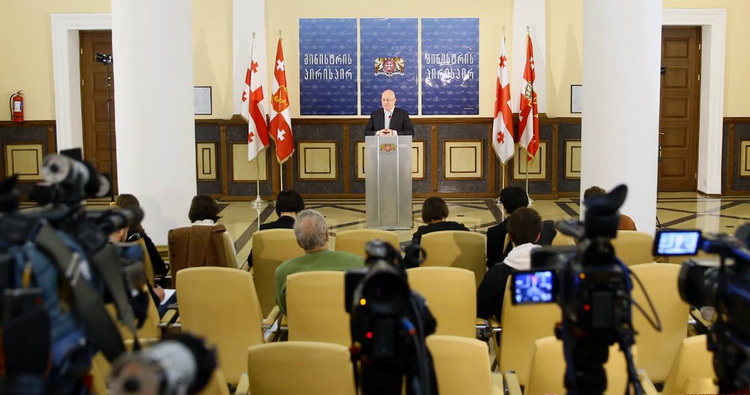Georgia's defence priorities for 2019 unveiled by minister Izoria

Georgia’s defence minister unveiled initiatives and programmes for 2019 in Tbilisi in Monday. Photo: Ministry of Defence of Georgia press office.
Increased salaries and new apartments for service members, improved combat capability and new focus on cybersecurity will be the focus of the Georgian armed forces in 2019 and beyond, the country’s Minister of Defence Levan Izoria revealed on Monday.
As part of this year’s defence projects and reforms, over 7,500 service members will benefit from a pay increase, the minister told the media in a briefing in Tbilisi.
The change will affect personnel of the Georgia Defence Readiness Programme (GDRP) and those serving in “other units”, the head of the defence institution noted.
#Georgia for the 1st time will take lead in execution of the #NATO-#Georgia joint #military exercise to be held in March near #Tbilisi with the participation of 22 @NATO member states and allies ???????????????? https://t.co/m5eiTmu4L6 @ModGovGe @BakradzeDavid @MFAgovge
— Embassy of Georgia (@GeorgianEmbassy) January 28, 2019
Izoria told reporters his ministry had “ambition to [eventually] include all service members” in the armed forces.
The salary increase is part of a reform which also aims to improve social conditions for troops and their families, a “priority” policy launched in 2016.
The reform will see handover of apartments to the remaining armed forces personnel who have been entitled to new homes as part of their contracts.
All service members to whom the state has the contractual obligation will receive apartments in Gori and Tbilisi. We will conclude this [process] in 2020,” Izoria said.
In terms of combat preparation of Georgian units, the GDRP, a joint project of the defence ministry and and the US Department of Defence, will involve three infantry battalions in 2019.
Two battalions have so far graduated from the training of the programme which has been referred to as the “most ambitious” and serves to improve combat readiness of units.
Other reveals by the ministry included plans for focusing on smaller-size units within brigades, the largest-size unit of the Georgian Armed Forces. The smaller units will receive “equal capabilities”, improving their degree of autonomous operation.

Izoria revealed plans for expanding training grounds in Georgia used annually for multinational defence drills. Photo: Ministry of Defence of Georgia press office.
Soldiers serving in the ranks will receive upgraded air- and anti-tank assets in 2019.
The former will involve modernisation of seven of the United States-made UH-1 Iroquois helicopters serving in the forces within a 23 million GEL (about 8.6 million USD/7.6 million EUR) project. A purchase of a command-and-control air defence system from France is also planned.
Within the latter, the ministry will complete its purchase of the FGM-148 Javelin portable anti-tank launchers from the US, after the armed forces received their first weapons last year.
Special operations forces, engineering and logistics sections, communications and cybersecurity will also feature “significant initiatives” this year, Izoria noted.
Both NATO members and partner states see cyberspace as one of their operational dimensions — it is given particular significance alongside air, land and sea [fields].”
Accordingly, we will present a new strategy this year, which will include major priorities for cybersecurity,” Georgia’s defence minister said.
Expanded capability for defence drills at training areas in Georgia will be another focus of ongoing projects, with an aim of providing space for more effective national and multinational exercises in the country.
The defence ministry said Izoria’s meetings with reporters and non-governmental organisations for briefing sessions would become a regular occurrence throughout 2019.
 Tweet
Tweet  Share
Share